Thanks to its favourable location in the port of Ravenna (Italy), Donelli Eos, a Donelli Group company specialising in anti-corrosion coating and fireproofing of offshore structures, has become a benchmark supplier not only for shipbuilding businesses in the port but also for firms throughout Italy that need to adequately protect their structures against corrosion before they are exposed to the harsh environmental conditions caused by the salinity of the sea.
The offshore industry, including sectors such as petrochemical and renewable energy, especially the wind power field, accounts for a significant part of the world economy. In 2022, the offshore oil and gas sector achieved record profits, generating approximately 1.4 trillion US dollars in free cash flow globally – an increase driven by high energy prices and strong demand for hydrocarbons. The offshore wind market is also experiencing rapid growth, stimulated by industry-wide efforts to reduce carbon emissions. By 2030, it is expected to play a critical role in the transition to renewable energy, with potential revenues set to grow as countries such as the United States, China, and parts of Europe, including Italy, ramp up offshore wind projects. In Italy, the offshore sector is growing significantly in the field of floating wind power. The Italian market has great potential and can become the third largest in the world in this segment, with the prospect of creating up to 1.3 million jobs and generating an economic value of over 255 billion Euros while also maintaining a significant presence in the oil and gas sector.
One of the Italian infrastructures that is most focussing on transitioning to more sustainable energy technologies in both the petrochemical and wind power areas is the port of Ravenna. Considered one of Europe’s main commercial ports, thanks to its favourable geographical location for trade with the Eastern Mediterranean, the Black Sea, and the Middle and Far East markets, it is currently one of the most dynamic hubs in the energy supply industry as well. Indeed, it has yards equipped for constructing platforms to be installed worldwide, shipyards for building tugboats and support vessels for drilling rigs, and areas for services such as submarine pipeline, offshore platform, and diving support vessel laying.
“Precisely because of their direct impact on a country’s economy and industrial development, all these structures must function perfectly and safely. To do so, they must be protected with the most effective anti-corrosion solutions available, as they operate in the harshest conditions and in continuous contact with seawater,” explains Luca Biserna, plant manager at Donelli Eos Srl, the Donelli Group company based right in Ravenna and specialising in corrosion protection and fireproofing coatings and linings, insulation and thermal insulation, and in-shop infrastructure maintenance. “The critical conditions in which they operate can accelerate their structural degradation, potentially leading to serious safety incidents for both facilities and personnel and to significant financial losses.” In the oil and gas sector, costs for corrosion management and prevention are expected to reach 6.53 billion US dollars by 2032; in the wind energy sector, some figures estimate that the investment for maintenance work on wind turbines, including corrosion prevention, accounts for 30% of total operating costs.
“As applicators of corrosion protection coatings,” states Alessio Trisolino, the CEO of Donelli Alexo, another company of the Donelli Group, “our job is vital to extend the service life of structures and ensure their perfect functioning. Our long-standing history started in 1911, the profound expertise that distinguishes us, and the solid corporate structure we have built over time, currently consisting of 5 companies, enable our Group to present itself as a truly reliable partner in the highly competitive offshore and onshore corrosion protection market.”
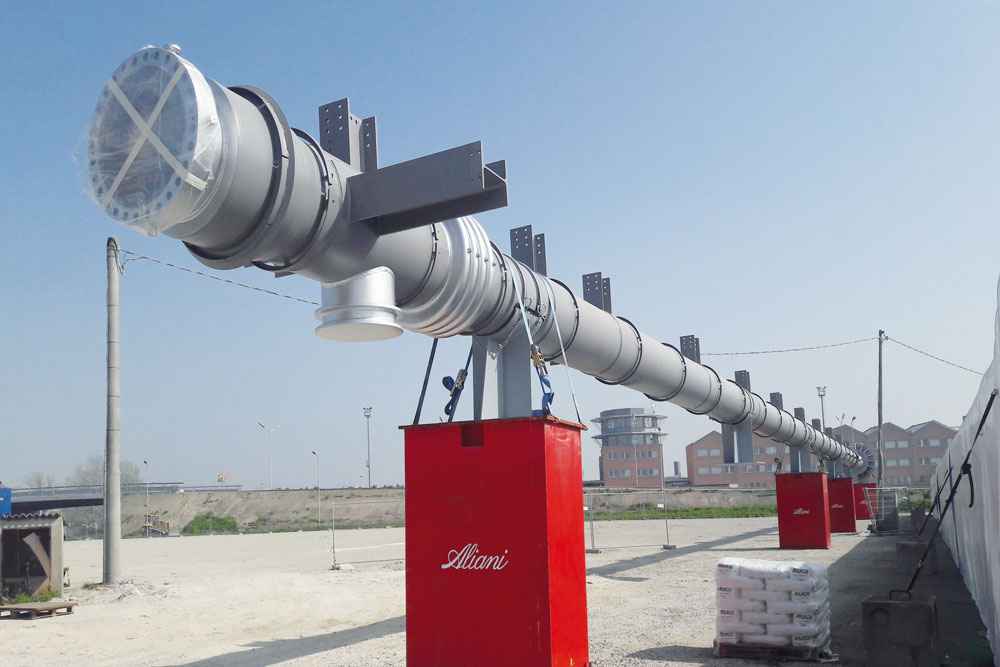 Onshore operation carried out by Donelli Eos. © Donelli Eos
Onshore operation carried out by Donelli Eos. © Donelli EosThe Donelli Group: five sites, one soul
‘5 sites, one soul’ is the motto Donelli has chosen to express its corporate strategy. “Speaking of ‘soul’”, emphasises Trisolino, “seems appropriate because that is precisely what can be found at our five locations, two of which (CX in Cuggiono, in the province of Milan, and MXP in Ferno, in the province of Varese) recently opened and perfectly consistent with our corporate identity – technologically advanced and characterised by largely automated process management but also by strong attention to detail, a trait that has always been one of our flagships.”
In addition to its sites in the Lombardy region, i.e. Cuggiono (two plants), Ferno, and Voghera, and the one in Ravenna, the other companies that complete the Group are Impresa Donelli (Legnano, Milan, with a site also in Ravenna), BerSud (Brindisi), Donelli Sh.p.k. (Albania), and Donelli Mozambique (Maputo, Mozambique). “Our Group’s strength lies in the flexibility and interchangeability of its plants, which are all equipped to perform any application process, although each with its own specialisation. This allows our customers to interface with a single company, which can, however, offer different services as if it were a set of different suppliers. The connections between our sites are immediate and efficient because they have been in operation for many years. At the same time, our staff is highly specialised and continuously trained.”
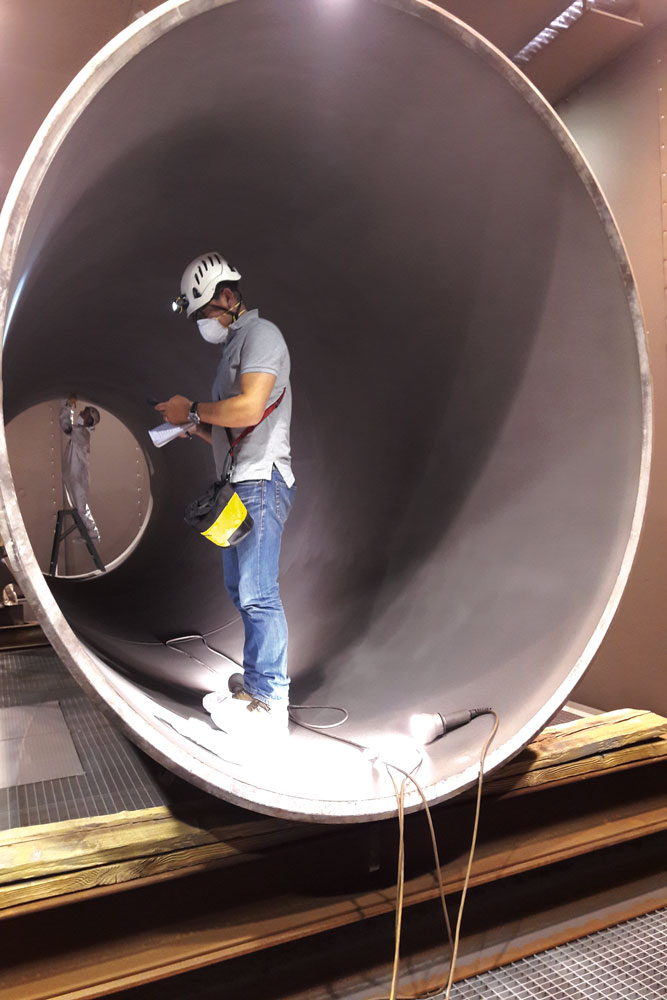 Some onshore operations carried out by Donelli Eos. © Donelli Eos
Some onshore operations carried out by Donelli Eos. © Donelli Eos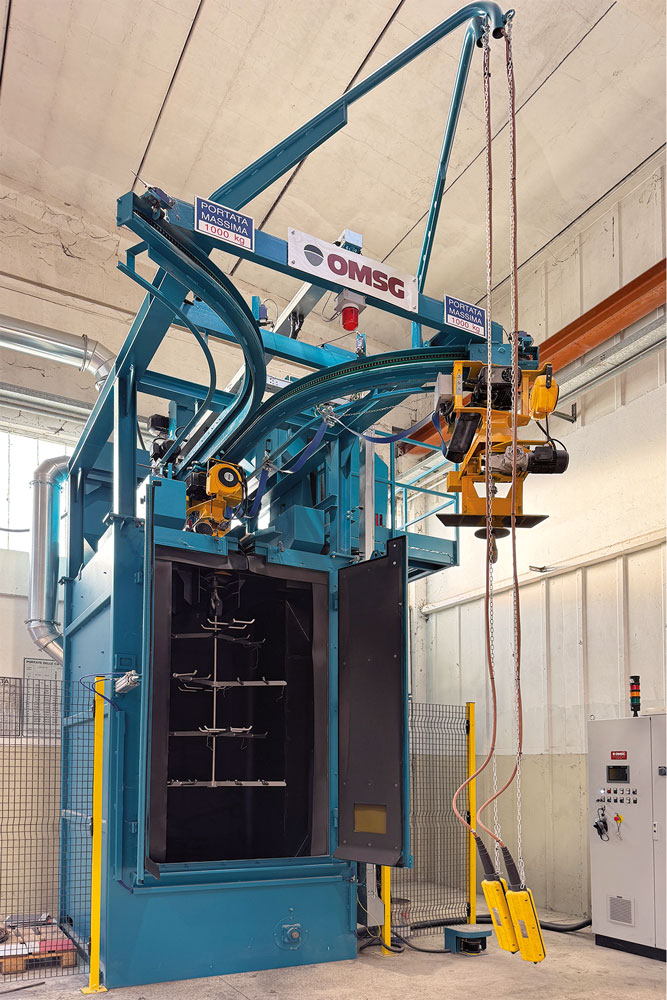 The new OMSG cluster shot blasting machine installed at Donelli Eos. © Donelli Eos
The new OMSG cluster shot blasting machine installed at Donelli Eos. © Donelli EosTraining as a driver of growth
Indeed, the Donelli Group places great importance on training to ensure maximum application performance. “Recently, in cooperation with employment agency Randstad, we organised very special training courses in the field at our Ravenna site,” describes Biserna, Donelli Eos’s plant manager. “We offered a temporary work contract to about twenty workers: the most motivated ones stayed and became permanently part of our team. We know that the commitment required by this profession is burdensome and that the job characteristics are complex, as working in this sector calls for uncommon mental flexibility to handle even the most complex situations. We sometimes carry out corrosion protection operations in our factory, but it is more often the case that we are required to work at our customers’ premises, especially when the structures’ size and tasks’ delicacy do not allow for material handling. For example, these days, we are finalising an important project at the yard of Rosetti Marino, the long-standing industrial Group providing engineering and construction services in several sectors, including energy, petrochemical, chemical, power, and shipbuilding, that is currently in charge of the revamping of the Ravenna regasifier.”
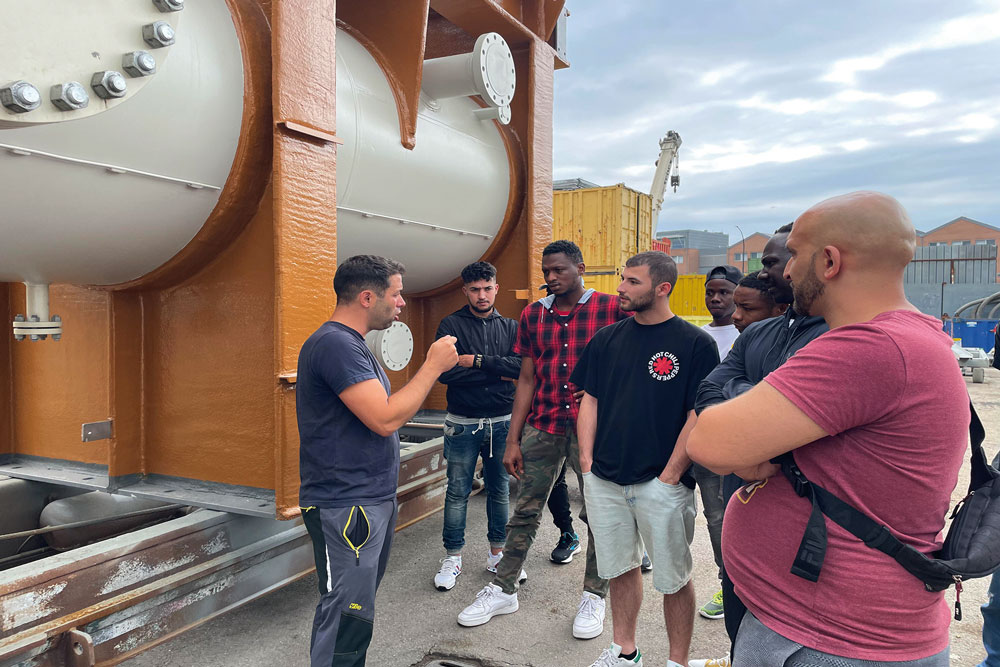 Donelli Eos organised a training course in the field to include new professional, highly motivated employees in its staff. © Donelli Eos
Donelli Eos organised a training course in the field to include new professional, highly motivated employees in its staff. © Donelli Eos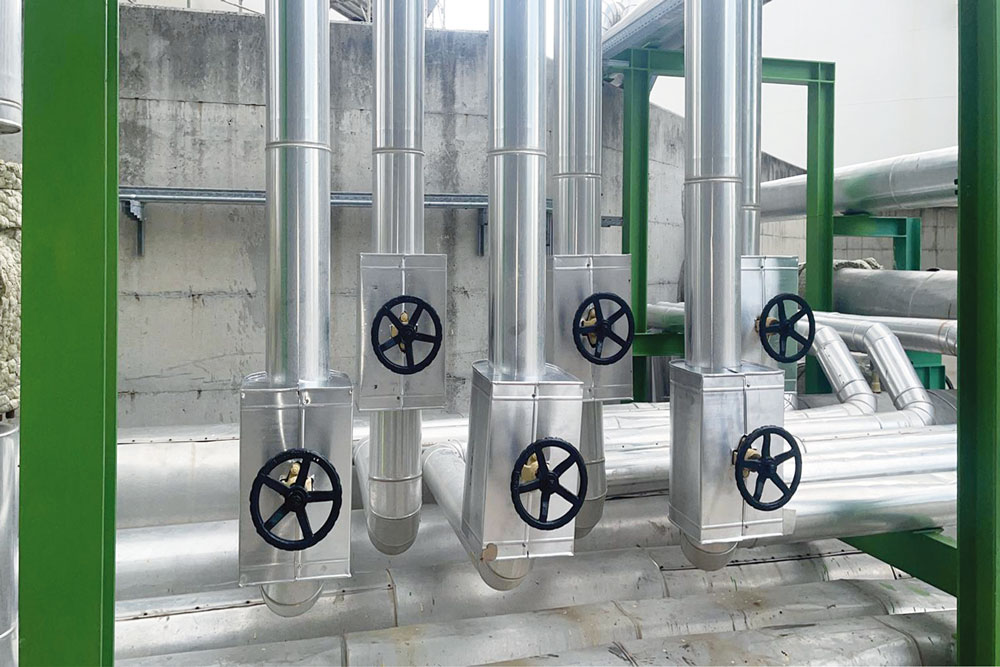 The insulation of a structure intended to be subjected to high temperatures. © Donelli Eos
The insulation of a structure intended to be subjected to high temperatures. © Donelli EosCorrosion protection of the new regasifier’s structures
The construction of the new floating storage and regasification unit (FSRU) is among the main projects involving the port of Ravenna, resulting in hectic shipbuilding activities. “The construction of the new regasifier, which is already nearing completion, is taking place in parallel with the dismantling of the Petra platform, which will be replaced by the new docking platform for the LNG carrier,” says Marco Fincato, technical director at Donelli Eos, to describe the project that his company has been supporting. “Rosetti Marino entrusted us with the coating of the new structures that will form the docking platform at its yard and the revamping of some parts of the old structures of the Petra platform that could be recovered at our workshop. Specifically, this entails applying fireproofing coatings to parts of this structure – with which we are familiar, having treated and coated the lower part of its main deck since 2010. When placing this order, Rosetti Marino was looking for a reliable partner capable not only of managing its three shot blasting and coating plants (which will soon become four thanks to our technical consultancy) with adequate skills but also of handling on-site application operations. These are perhaps one of the most undervalued but certainly most complex phases of our work: the touch-up phases at sea once the structures have been installed.”
Fireproofing coatings: a critical safety issue
“We implement different application cycles depending on the conditions under which the metal structure to be protected is intended to operate, in accordance with ISO 12944,” indicates Biserna. “If the structure will operate in atmospheric service, we adopt a tried and tested standard cycle; when the structure is to be subjected to very high temperatures, we physically and thermally insulate it to counteract corrosion. One of the specialisations that have helped us establish ourselves in this sector is the application of fireproofing coatings that can delay or limit fire damage: we have even formed a specially trained team for this type of operation. These are high-thickness coatings suitable for counteracting and delaying the adverse effects of a potential fire: especially in refineries, petrochemical plants, and offshore infrastructures, the characteristics of a possible fire are of such a magnitude and temperature that conditions are very severe. Contrary to civil fires, also called cellulosic fires, i.e. fuelled by flammable materials such as wood, paper, furniture, or textiles, hydrocarbon fires involve liquids such as solvents and gases and are characterised by very fast propagation and very high temperatures. It is, therefore, easy to understand how important it is to apply the most suitable, effective, and long-lasting fireproofing coating.” Finally, Donelli Eos performs thermal spray treatments on stainless steel, which are essential for preventing corrosion under insulation (CUI).
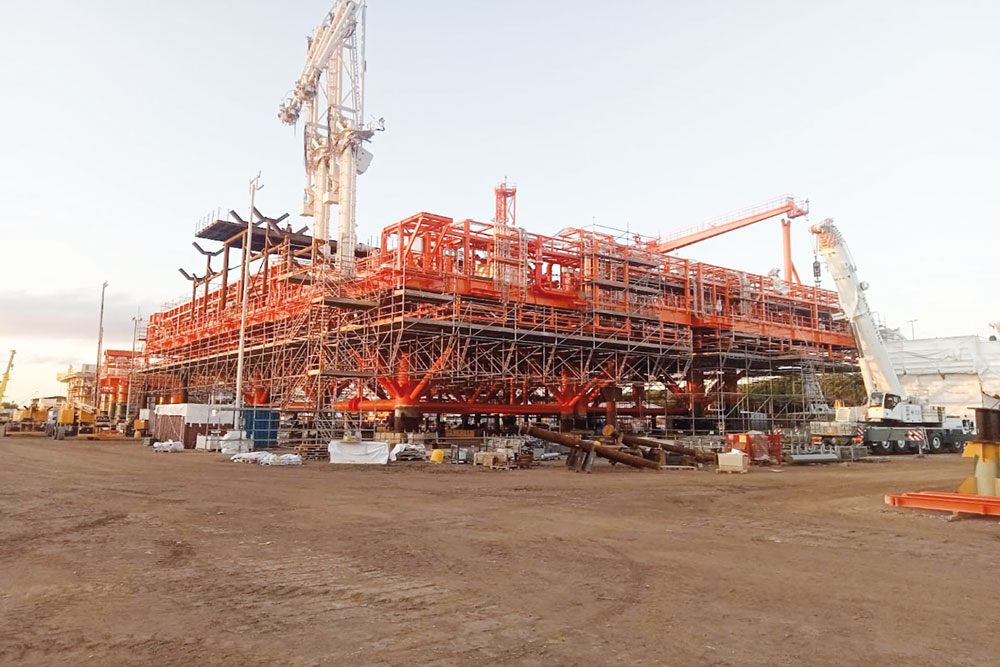 Some operations performed at the Rosetti Marino yard. © Donelli Eos
Some operations performed at the Rosetti Marino yard. © Donelli Eos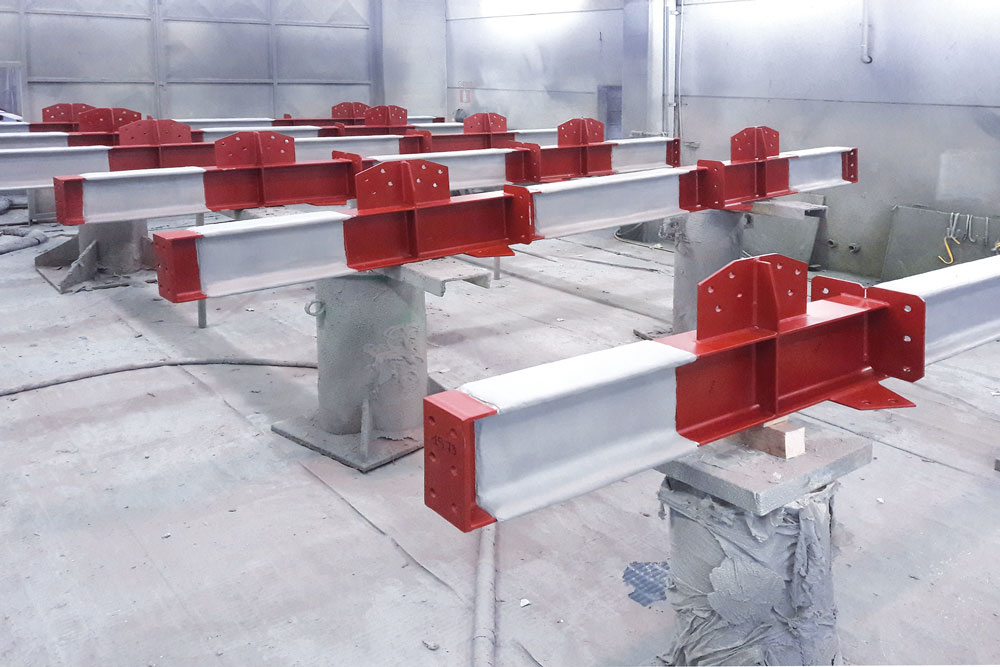 Donelli Eos specialises in fireproofing coatings that can delay or limit fire damage. © Donelli Eos
Donelli Eos specialises in fireproofing coatings that can delay or limit fire damage. © Donelli EosIn-shop plant automation
The Ravenna-based company is currently completing the installation of a new automatic shot blasting machine supplied by OMSG Officine Meccaniche San Giorgio (Villa Cortese, Milan). “Unlike the Group’s other sites,” notes Biserna, “our factory is not equipped with a conveyor. To limit manual handling, especially in the case of small parts that require a lot of effort in the shot blasting booth despite the limited size of the task, we decided to invest in an automatic system that facilitates the work of our operators because they remain outside the plant with considerable advantages in terms of safety, time, and labour reduction.” Such a requirement underlines the great variety of metalwork fabrications handled by the Donelli Group in part size and geometry.
A massive variety of treated fabrications
“Most of the structures transported along the north and north-east of the Italian Peninsula and destined for offshore facilities are handled by us,” emphasises Fincato. “We protect against corrosion vital parts of offshore platforms and wind turbines, including high-pressure pipelines for the transport of gas from underground sources or jacked support structures for wind blades, but also containers, compressor cabinets and bases, buried pipelines that we treat with a cold wrapping tape application process, and transformer cabinets. In the case of orders with large batch quantities, we can distribute these processes among the Group’s various plants – a testament to the flexibility of our company’s structure.
“Another operation in which Impresa Donelli and Donelli Eos specialise is the re-coating of helipad flight decks, including horizontal markings in compliance with AIMo regulations, related to the maintenance of facilities and equipment, and ENAC ones. We also carry out friction tests with special equipment to certify the helipads’ suitability and determine the deadline for the following inspection, which can be annual, biannual, or six-monthly. Finally, we also carry out reflectance measurements of both onshore and offshore tanks containing hydrocarbons according to European emission abatement regulations.”
Offshore management: the competitive advantage of Impresa Donelli and Donelli Eos
One of the most complex aspects of being a protective coating applicator is logistics, in terms of both equipment and personnel. “Managing these operations at sea is even more complex because they are affected by weather conditions, and problems to be solved are around the corner more frequently than with onshore works since the intensity of the waves, the strength of the currents, and the speed of the wind are not predictable,” explains Biserna. “Furthermore, on offshore facilities, space is limited in terms of staff accommodation and material storage, transport is very slow, and the environment is highly corrosive. Given all these variables, whereas a repair on land may take a few hours, it could take weeks at sea.”
“However, this is where our strength lies,” Trisolino concludes. “We have several years of experience in this field, which have allowed us to refine our techniques and procedures and, above all, choose our staff carefully, training and integrating only highly motivated people into our team. We are a benchmark applicator for this industry and have a solid corporate structure: this has enabled us to serve major companies in the offshore industry and beyond, such as ENI, even for long-term projects all over the globe. The flexibility-based strategy that distinguishes us and that we have emphasised with our motto is the key element that enables us to meet the needs of any customer, even with the most complex tasks. We are aware of the importance of our work, which has a major impact on infrastructure operation and, therefore, has a significant influence on the global economy.”